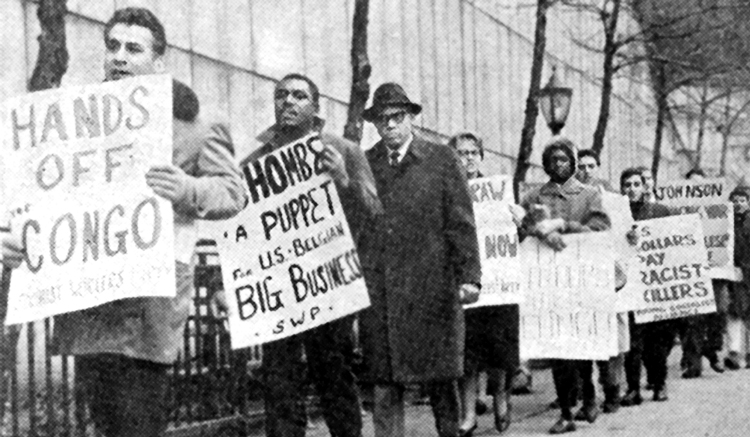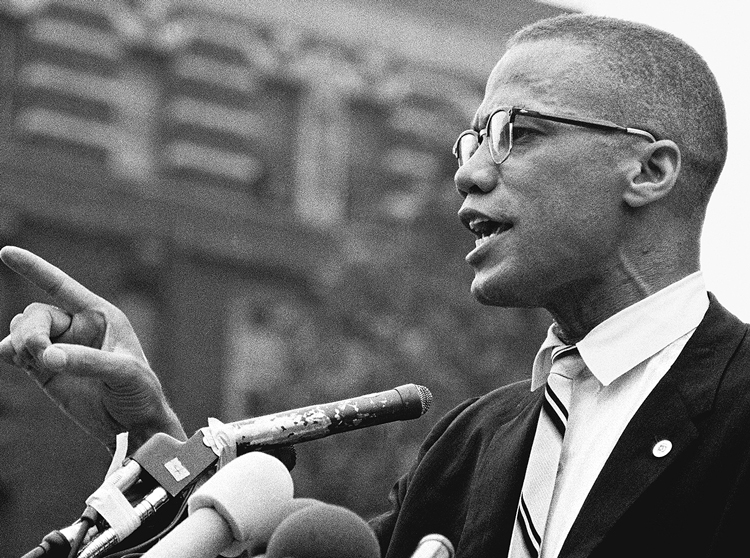Feb. 21 marks the 60th anniversary of the assassination of Malcolm X. The excerpt below is from February 1965: The Final Speeches by Malcolm X, one of Pathfinder’s Books of the Month for February. It is from a speech entitled “The oppressed masses of the world cry out for action against the common oppressor,” which Malcolm gave to a packed meeting at the London School of Economics Feb. 11, 1965. He spoke out against Washington’s military intervention against liberation forces in the Congo and in Vietnam. In the Congo, the U.S. rulers backed the proimperialist government of Moise Tshombe, who in 1961 had helped overthrow and murder Patrice Lumumba, the leader of the country’s first independent government after the downfall of Belgian colonial rule. Copyright © 1992 by Betty Shabazz and Pathfinder Press. Reprinted by permission.
[T]he Western governments have permitted themselves to get trapped, in a sense, in backing Tshombe, the same as the United States is trapped over there in South Vietnam. If she goes forward she loses, if she backs up she loses. She’s getting bogged down in the Congo in the same way.
Because no African troops win victories for Tshombe. They never have. The only war, the only battles won by the African troops, in the African revolution, in the Congo area, were those won by the freedom fighters from the Oriental province. They won battles with spears, stones, twigs. They won battles because their heart was in what they were doing. But Tshombe’s men from the central Congo government never won any battles. And it was for this reason that he had to import these white mercenaries, the paid killers, to win some battles for him. Which means that Tshombe’s government can only stay in power with white help, with white troops.
Well, there will come a time when he won’t be able to recruit any more mercenaries, and the Western powers, who are really behind him, will then have to commit their own troops openly. Which means you will then be bogged down in the Congo the same as you’re bogged down over there now in South Vietnam. And you can’t win in the Congo. If you can’t win in South Vietnam, you know you can’t win in the Congo.
Just let me see. You think you can win in South Vietnam?
The French were deeply entrenched. The French were deeply entrenched in Vietnam for a hundred years or so. They had the best weapons of warfare, a highly mechanized army, everything that you would need. And the guerrillas come out of the rice paddies with nothing but sneakers on and a rifle [Laughter] and a bowl of rice, nothing but gym shoes — tennis shoes — and a rifle and a bowl of rice. And you know what they did in Dien Bien Phu. They ran the French out of there. And if the French were deeply entrenched and couldn’t stay there, then how do you think someone else is going to stay there, who is not even there yet.
Yes, all of them are brothers. They were still — they had a bowl of rice and a rifle and some shoes. I don’t care whether they came from China or South Vietnam. And the French aren’t there anymore. We don’t care how they did it; they’re not there anymore. [Malcolm laughs; laughter from the audience] The same thing will happen in the Congo.
See, the African revolution must proceed onward, and one of the reasons that the Western powers are fighting so hard and are trying to cloud the issue in the Congo is that it’s not a humanitarian project. It’s not a feeling or sense of humanity that makes them want to go in and save some hostages, but there are bigger stakes.
They realize not only that the Congo is a source of mineral wealth, minerals that they need. But the Congo is so situated strategically, geographically, that if it falls into the hands of a genuine African government that has the hopes and aspirations of the African people at heart, then it will be possible for the Africans to put their own soldiers right on the border of Angola and wipe the Portuguese out of there overnight.
So that if the Congo falls, Mozambique and Angola must fall. And when they fall, suddenly you have to deal with [Southern Rhodesian Prime Minister] Ian Smith. He won’t be there overnight once you can put some troops on his borders. [Applause] Oh yes. Which means it will only be a matter of time before they will be right on the border with South Africa, and then they can talk the type of language that the South Africans understand. And this is the only language that they understand. [Applause]
I might point out right here and now — and I say it bluntly — that you have had a generation of Africans who actually have believed that they could negotiate, negotiate, negotiate, and eventually get some kind of independence. But you’re getting a new generation that is being born right now, and they are beginning to think with their own mind and see that you can’t negotiate upon freedom nowadays. If something is yours by right, then you fight for it or shut up. If you can’t fight for it, then forget it. [Applause]
So we in the West have a stake in the African revolution. We have a stake for this reason: as long as the African continent was dominated by enemies, and as long as it was dominated by colonial powers, those colonial powers were enemies of the African people. They were enemies to the African continent. They meant the African people no good, they did the African people no good, they did the African continent no good.
And then in the position that they were, they were the ones who created the image of the African continent and the African people. They created that continent and those people in a negative image. And they projected this negative image abroad. They projected an image of Africa in the people abroad that was very hateful, extremely hateful.



